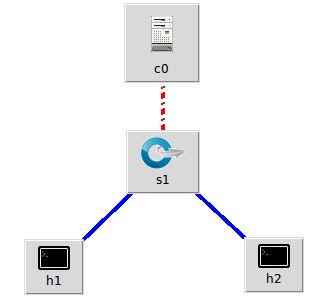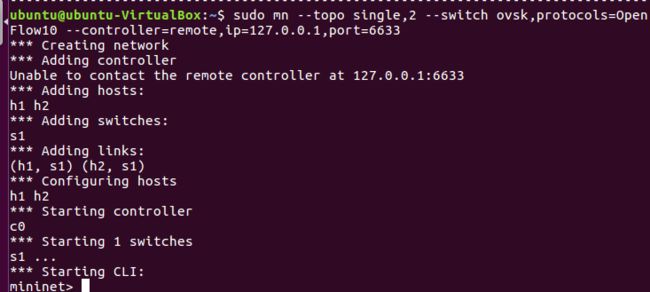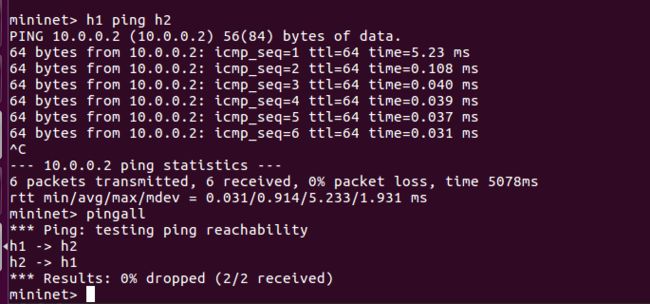1.浏览RYU官网学习RYU控制器的安装和RYU开发入门教程,提交你对于教程代码的理解,包括但不限于:
描述官方教程实现了一个什么样的交换机功能?
泛洪转发:使交换机能够将收到的数据包转发到所有端口
控制器设定交换机支持什么版本的OpenFlow?
支持OpenFlow1.0:
OFP_VERSIONS = [ofproto_v1_0.OFP_VERSION]
教程代码:
from ryu.base import app_manager
from ryu.controller import ofp_event
from ryu.controller.handler import MAIN_DISPATCHER
from ryu.controller.handler import set_ev_cls
from ryu.ofproto import ofproto_v1_0
from ryu.lib.packet import packet
from ryu.lib.packet import ethernet
from ryu.lib.packet import ether_types
from ryu.lib.packet import ipv4
class SimpleSwitch(app_manager.RyuApp):
OFP_VERSIONS = [ofproto_v1_0.OFP_VERSION]
def __init__(self, *args, **kwargs):
super(SimpleSwitch, self).__init__(*args, **kwargs)
@set_ev_cls(ofp_event.EventOFPPacketIn, MAIN_DISPATCHER)
def _packet_in_handler(self, ev):
msg = ev.msg
datapath = msg.datapath
ofproto = datapath.ofproto
pkt = packet.Packet(msg.data)
eth = pkt.get_protocol(ethernet.ethernet)
if eth.ethertype == ether_types.ETH_TYPE_LLDP:
#ignore lldp packet
return
if eth.ethertype == ether_types.ETH_TYPE_IPV6:
#ignore ipv6 packet
return
print ("PACKET_IN:")
print (eth.ethertype)
print ("ethernet:")
print ("eth_src=",eth.src)
print ("eth_dst=",eth.dst)
if eth.ethertype == ether_types.ETH_TYPE_IP:
_ipv4 = pkt.get_protocol(ipv4.ipv4)
print ("ipv4:")
print ("ip_src=",_ipv4.src)
print ("ip_dst=",_ipv4.dst)
dpid = datapath.id
out_port = ofproto.OFPP_FLOOD
actions = [datapath.ofproto_parser.OFPActionOutput(out_port)]
data = None
out = datapath.ofproto_parser.OFPPacketOut(datapath=datapath, buffer_id=msg.buffer_id, in_port=msg.in_port, actions=actions, data=data)
datapath.send_msg(out)
print ("PACKET_OUT...")
print控制器设定了交换机如何处理数据包?
@set_ev_cls(ofp_event.EventOFPPacketIn, MAIN_DISPATCHER)//当Ryu收到OpenFlow packet_in调用“packet_in_handler”方法
msg = ev.msg//用ev.msg对象创建一个packet_in数据结构
datapath = msg.datapath//一个数据路径(开关?)
eth = pkt.get_protocol(ethernet.ethernet)//以太网链路协议
dpid = datapath.id
out_port = ofproto.OFPP_FLOOD//OFPP_FLOOD应该是提供泛洪功能的端口号,把接收到的数据包转发到这个端口,实现泛洪。
actions = [datapath.ofproto_parser.OFPActionOutput(out_port)]//设置下发动作
out = datapath.ofproto_parser.OFPPacketOut(datapath=datapath, buffer_id=msg.buffer_id, in_port=msg.in_port, actions=actions, data=data)//转发出的数据包
datapath.send_msg(out)2.根据官方教程和提供的示例代码(SimpleSwitch.py),将具有自学习功能的交换机代码(SelfLearning.py)补充完整
from ryu.base import app_manager
from ryu.controller import ofp_event
from ryu.controller.handler import MAIN_DISPATCHER
from ryu.controller.handler import set_ev_cls
from ryu.ofproto import ofproto_v1_0
from ryu.lib.mac import haddr_to_bin
from ryu.lib.packet import packet
from ryu.lib.packet import ethernet
from ryu.lib.packet import ether_types
class SimpleSwitch(app_manager.RyuApp):
# TODO define OpenFlow 1.0 version for the switch
# add your code here
OFP_VERSIONS = [ofproto_v1_0.OFP_VERSION]
def __init__(self, *args, **kwargs):
super(SimpleSwitch, self).__init__(*args, **kwargs)
self.mac_to_port = {}
def add_flow(self, datapath, in_port, dst, src, actions):
ofproto = datapath.ofproto
match = datapath.ofproto_parser.OFPMatch(
in_port=in_port,
dl_dst=haddr_to_bin(dst), dl_src=haddr_to_bin(src))
mod = datapath.ofproto_parser.OFPFlowMod(
datapath=datapath, match=match, cookie=0,
command=ofproto.OFPFC_ADD, idle_timeout=0, hard_timeout=0,
priority=ofproto.OFP_DEFAULT_PRIORITY,
flags=ofproto.OFPFF_SEND_FLOW_REM, actions=actions)
# TODO send modified message out
# add your code here
datapath.send_msg(mod)
@set_ev_cls(ofp_event.EventOFPPacketIn, MAIN_DISPATCHER)
def _packet_in_handler(self, ev):
msg = ev.msg
datapath = msg.datapath
ofproto = datapath.ofproto
pkt = packet.Packet(msg.data)
eth = pkt.get_protocol(ethernet.ethernet)
if eth.ethertype == ether_types.ETH_TYPE_LLDP:
# ignore lldp packet
return
if eth.ethertype == ether_types.ETH_TYPE_IPV6:
# ignore ipv6 packet
return
dst = eth.dst
src = eth.src
dpid = datapath.id
self.mac_to_port.setdefault(dpid, {})
self.logger.info("packet in DPID:%s MAC_SRC:%s MAC_DST:%s IN_PORT:%s", dpid, src, dst, msg.in_port)
# learn a mac address to avoid FLOOD next time.
self.mac_to_port[dpid][src] = msg.in_port
if dst in self.mac_to_port[dpid]:
out_port = self.mac_to_port[dpid][dst]
else:
out_port = ofproto.OFPP_FLOOD
# TODO define the action for output
# add your code here
actions = [datapath.ofproto_parser.OFPActionOutput(out_port)]
# install a flow to avoid packet_in next time
if out_port != ofproto.OFPP_FLOOD:
self.logger.info("add flow s:DPID:%s Match:[ MAC_SRC:%s MAC_DST:%s IN_PORT:%s ], Action:[OUT_PUT:%s] ", dpid, src, dst, msg.in_port, out_port)
self.add_flow(datapath, msg.in_port, dst, src, actions)
data = None
if msg.buffer_id == ofproto.OFP_NO_BUFFER:
data = msg.data
# TODO define the OpenFlow Packet Out
# add your code here
out = datapath.ofproto_parser.OFPPacketOut(datapath=datapath, buffer_id=msg.buffer_id, in_port=msg.in_port, actions=actions, data=data)
datapath.send_msg(out)
print ("PACKET_OUT...")
3.在mininet创建一个最简拓扑,并连接RYU控制器
4.验证自学习交换机的功能,提交分析过程和验证结果
在连接RYU控制器后,再次测试h1和h2的连通性,可以看到h1和h2已经可以ping通了:
查看交换机的流表,发现多了端口二发往端口一和端口一发往端口二的两条流表,当前拓扑只有两台主机,所以只有两条流表:
5.写下你的实验体会
做了这么多次的SDN实验了,这已经是第五次的作业了,这次内容是不难的,主要的问题应该是都在RYU控制器的安装和Python、pip的配置了。前几天没有完成作业是因为无法运行ryu控制器,再安装完RYU控制器后,准备运行测试文件时,就会因为无法找到usr/bin/pip3文件内main()函数而报错,无法运行。上网搜了下发现是因为pip版本的问题,最后的解决办法是修改文件读写权限,把正确的pip3.py文件内容写入。





